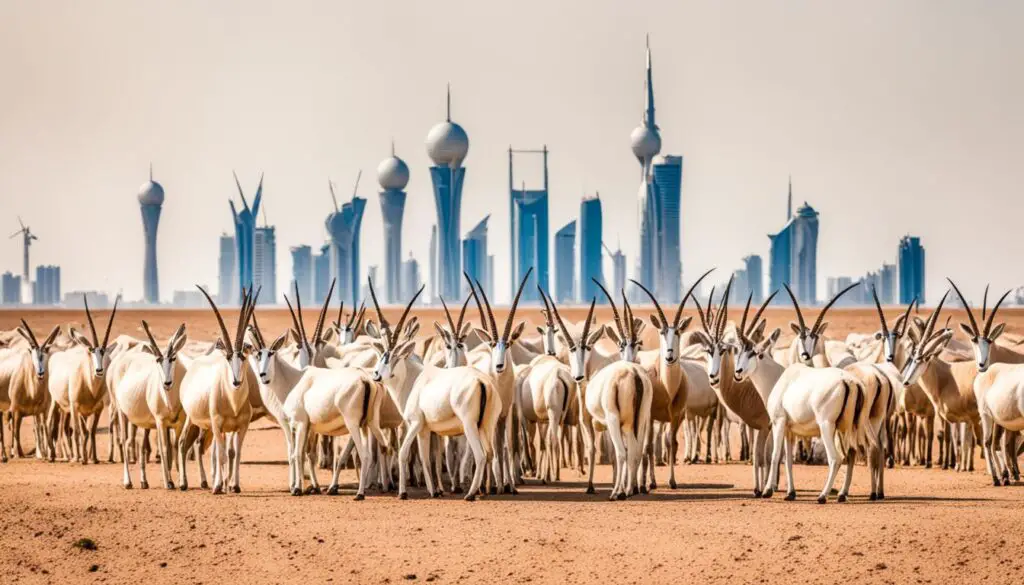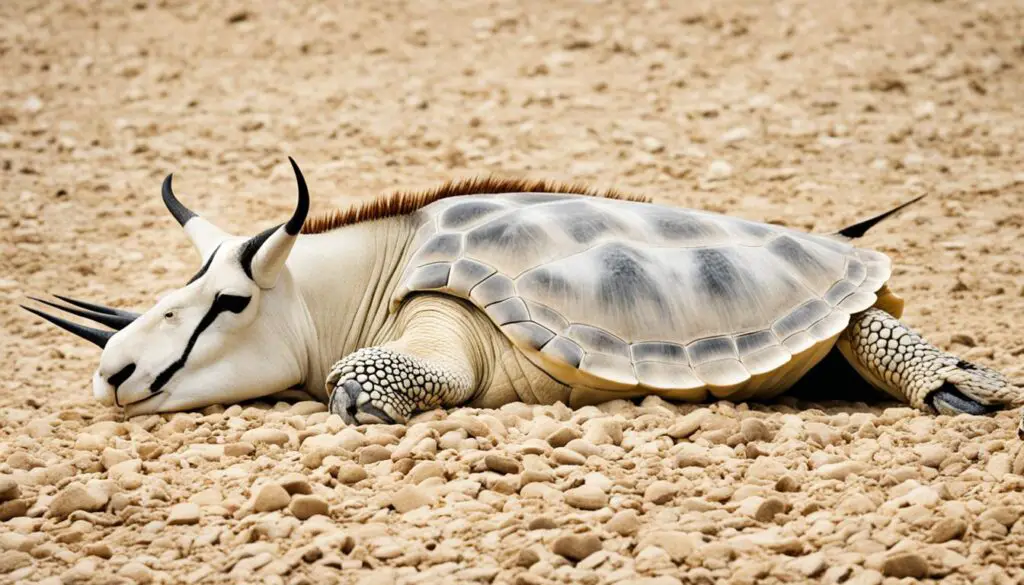Did you know that Kuwait, a small country in the Middle East, is home to a surprising array of wildlife? Despite its arid desert environment, Kuwait boasts a rich and diverse ecosystem that supports a wide range of animal species. From migratory birds to striking reptiles, Kuwaiti wildlife has captured the hearts of both locals and visitors alike. In addition, the country’s commitment to animal conservation is evident through the presence of dedicated animal sanctuaries and initiatives. Let’s explore the fascinating world of animals in Kuwait and the efforts made to protect their habitats and well-being.

Key Takeaways:
- Kuwait is home to a diverse array of animal species, thriving in its unique desert environment.
- The country has dedicated efforts towards animal conservation, including organizations like the Kuwait Society for the Protection of Animals and Their Habitat (K’S PATH) and the Kuwait Animal Rescue Unit (KARU).
- Endangered species in Kuwait face challenges due to habitat loss and adverse human activities, highlighting the importance of conservation efforts.
- Kuwaiti animal sanctuaries, such as the Mubarak Al-Kabeer Reserve and the Kuwait Zoo, provide vital habitats and education on wildlife conservation.
- The veterinary care provided in Kuwait ensures the well-being of both domestic and wild animals, contributing to overall conservation efforts.
Efforts towards Animal Conservation in Kuwait
Kuwait has been actively involved in animal conservation efforts to protect its wildlife and preserve biodiversity. Several organizations and initiatives focus on rescuing and rehabilitating animals, providing veterinary care, and raising awareness about the importance of conservation.
The Kuwait Society for the Protection of Animals and Their Habitat (K’S PATH) is one such organization that promotes animal welfare and conservation in the country. They work towards rehabilitating injured animals, providing medical care, and educating the public about responsible pet ownership and wildlife conservation.
Another organization, the Kuwait Animal Rescue Unit (KARU), focuses on rescuing and rehoming stray animals in Kuwait. They work closely with local authorities and veterinary clinics to provide necessary care and find suitable homes for these animals.
Additionally, the Ministry of Interior in Kuwait has a dedicated department for the welfare and protection of animals. They enforce animal welfare laws and regulations and work towards ensuring the well-being of animals in the country.
Organizations and Initiatives for Animal Conservation
| Organization/Initiative | Mission |
|---|---|
| Kuwait Society for the Protection of Animals and Their Habitat (K’S PATH) | Promoting animal welfare, rehabilitating injured animals, providing medical care, and educating the public about responsible pet ownership and wildlife conservation |
| Kuwait Animal Rescue Unit (KARU) | Rescuing and rehoming stray animals by working closely with local authorities and veterinary clinics |
| Ministry of Interior | Enforcing animal welfare laws and regulations and ensuring the well-being of animals in Kuwait |
Through the combined efforts of these organizations, Kuwait strives to protect its wildlife, provide veterinary care for animals, and create a sustainable environment for both domestic and wild species.
Endangered Species in Kuwait
Despite its desert environment, Kuwait is home to several endangered species that are facing threats due to habitat loss, overhunting, and adverse human activities. These species play a vital role in maintaining the ecological balance and biodiversity of the region.
Some of the endangered species in Kuwait include:
- Arabian wolf
- Arabian oryx
- Striped hyena
- Jackal
- Honey badger
- Sand cat
- Ruppell’s fox
- Cape hare
These species have become critically endangered or extinct in Kuwait due to various factors. Habitat loss and desertification have significantly impacted their natural habitats, making it difficult for them to survive.
The Arabian oryx, for example, was once considered extinct in the wild in Kuwait but has been reintroduced through conservation efforts. Ongoing conservation initiatives are essential to protect and preserve these endangered species and maintain the biodiversity of Kuwait.

Conservation Efforts for Endangered Species
Kuwait is actively involved in conservation efforts to protect its endangered species. Various organizations, such as the Kuwait Society for the Protection of Animals and Their Habitat (K’S PATH), are working towards rehabilitating injured animals and raising awareness about wildlife conservation.
Efforts to restore and protect the natural habitats of these endangered species are also underway. By implementing strict conservation measures and regulations, Kuwait aims to provide a safe and sustainable environment for its wildlife.
Kuwait Animal Sanctuaries
Kuwait is home to several animal sanctuaries that provide a safe haven for rescued and endangered animals. These sanctuaries play a vital role in the conservation and preservation of Kuwait’s wildlife, contributing to efforts in animal rescue and protected environments for endangered species.
Mubarak Al-Kabeer Reserve
The Mubarak Al-Kabeer Reserve, located on Boubyan Island, is a Ramsar Site known for its lagoons and salt marshes. It serves as a crucial stopover for migratory birds, providing a habitat for wetland birds migrating from Eurasia to Africa. This reserve is also home to the world’s largest breeding colony of crab-plovers.
Kuwait Zoo
The Kuwait Zoo is another notable animal sanctuary in Kuwait. As a zoological park, it houses a variety of animals, including mammals, reptiles, birds, and marine life. The zoo not only provides a safe environment for these animals but also aims to educate visitors about wildlife conservation and the importance of protecting endangered species.
| Animal Sanctuaries in Kuwait | Description |
|---|---|
| Mubarak Al-Kabeer Reserve | A Ramsar Site located on Boubyan Island, known for its lagoons, salt marshes, and as a stopover for migratory birds. |
| Kuwait Zoo | A zoological park housing a variety of animals, aiming to educate visitors about wildlife conservation. |
These animal sanctuaries in Kuwait provide a valuable opportunity for the public to connect with wildlife and learn about the importance of conservation. By promoting awareness and protection, these sanctuaries contribute to safeguarding Kuwait’s unique wildlife for future generations.
Veterinary Care for Kuwaiti Animals
Kuwait has made significant progress in providing veterinary care for its animals. The country has several veterinary clinics and hospitals offering a wide range of medical services for both domestic and wild animals. These facilities are equipped to provide treatment, perform surgeries, administer vaccinations, and offer rehabilitation services for injured or sick animals.
Additionally, Kuwait has dedicated wildlife rehabilitation centers that specialize in caring for injured or orphaned wildlife. These centers play a crucial role in rehabilitating animals and reintroducing them to their natural habitats whenever possible. The efforts of these rehabilitation centers contribute significantly to the overall conservation and well-being of Kuwait’s wildlife.

Example Wildlife Rehabilitation Centers in Kuwait:
| Rehabilitation Center | Location | Services Offered |
|---|---|---|
| The Kuwait Animal Rescue Center | Kuwait City |
|
| The Wildlife Rehabilitation Center | Al Jahra |
|
These veterinary clinics and wildlife rehabilitation centers work hand in hand to ensure the well-being and conservation of both domestic and wild animals in Kuwait. Through their dedication and expertise, they not only provide essential medical care but also contribute to the overall protection and preservation of Kuwait’s precious wildlife.
Conclusion
The protection of Kuwait’s diverse wildlife and the preservation of endangered species play a vital role in maintaining biodiversity and ensuring the ecological balance of the country. Despite the challenges posed by the desert environment, Kuwait has made significant strides in animal rescue, rehabilitation, and conservation. The concerted efforts of organizations, sanctuaries, and veterinary clinics in Kuwait have been instrumental in safeguarding the welfare of Kuwaiti wildlife.
Furthermore, raising awareness about wildlife conservation and promoting responsible pet ownership are crucial elements in ensuring the long-term survival of Kuwait’s wildlife. By educating the public about the importance of protecting and preserving the natural habitats of endangered species, Kuwait can inspire communities to actively contribute to conservation efforts.
In order to sustain these vital conservation initiatives, it is crucial to continue supporting organizations dedicated to animal welfare and rehabilitation. By providing resources, funding, and public support, we can ensure the continued success of wildlife rehabilitation in Kuwait. Together, we can protect Kuwaiti wildlife, conserve endangered species, and contribute to global efforts in animal conservation and preservation.
